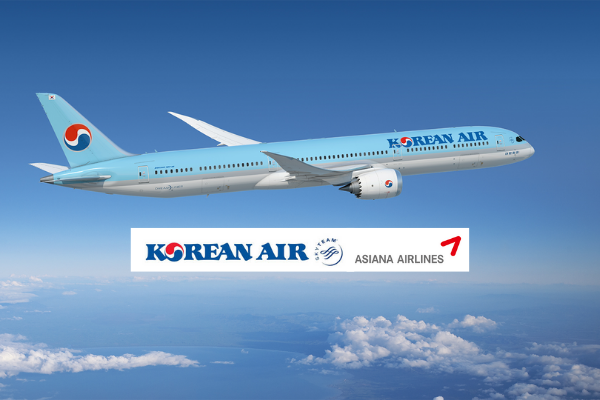
- After days of talks, Korean Air is set to purchase the heavily in-debt Asiana Airlines
- Korean Air will become the largest shareholder of Asiana with 2.5 trillion KRW ($2.2 billion) in paid-in capital increase
- The integrated South Korean carrier will be the 10th largest in the world
- Hanjin Group Conglomerate will make the acquisition with the help of a 800 billion KRW ($722 million) investment from Korea Development Bank, facilitating the rapid merger
- The move comes after numerous potential bidders including SK, Hanwha, Aekyung Group dropped out
- Asiana has been struggling financially for several years with debt exceeding 12.2 trillion KRW ($11 billion) as of June 2020
- Both airlines are expected to operate independently as two full-service carriers
- LCCs owned by both airlines, including Jin Air, Air Busan and Air Seoul, will be integrated in stages
It’s official.
On November 16th, 2020, the Korean government and Korea Development Bank (KDB) announced the acquisition of Asiana Airlines by Korean Air, the largest airline in South Korea.
The launch of an integrated national airline is a strategy to boost competitiveness in the aviation industry. Once the acquisition is completed, Korean Air will be the 10th largest airline in the world.
KDB announced on November 16th that “we will promote the merger of Korean Air and Asiana Airlines. We seek to strengthen fundamental competitiveness through the launch of an integrated national carrier.”
The Korean government held a meeting with relevant ministers earlier regarding the normalization plan for Asiana Airlines, and came to a decision.
KDB will invest 800 billion KRW ($722 million) into Hanjin KAL, which is the highest level of Hanjin Group management. 500 billion KRW ($451 million) will be a paid-in capital increase allocated to third parties, and 300 billion KRW ($271 million) will be used to acquire exchangeable bonds (EB) with Korean Air stock as an underlying asset.
Hanjin KAL announced that it will lend this 800 billion KRW ($722 million) to Korean Air.
In addition, Hanjin KAL will participate in Korean Air’s 2.5 trillion KRW ($2.2 billion) with a paid-in capital increase for the acquisition of Asiana Airlines. 731.7 billion KRW ($660 million) worth of shares will be allocated to Hanjin KAL, which will be Hanjin KAL’s 29.2% stake in Korean Air after the stock acquisition. The shares are expected to be acquired on March 13th next year.
Korean Air will invest 1.8 trillion KRW ($1.6 billion) in Asiana Airlines as a paid-in capital increase, in order to acquire new Asiana shares worth 1.5 trillion KRW ($1.3 billion). After acquiring the stock, Korean Air’s stake in Asiana Airlines will be 63.9%, making it the largest shareholder. The expected date of acquisition is June 30th next year.
Korean Air also will acquire perpetual bonds of 300 billion KRW ($271 million) from Asiana Airlines.
The stated reason for taking over Asiana Airlines is to quickly stabilize the Korean aviation industry, which is on the verge of collapsing, due to COVID-19.
A Korean Air official explained, “we decided to take this deal in order to reduce the burden on the public by minimizing the input of additional public funds, and by securing fundamental competitiveness through the restructuring of the aviation industry.”
KDB also announced that it will pursue a phased integration with the three LCC subsidiaries of the two companies (Jin Air, Air Busan and Air Seoul).
This merged national carrier will be positioned as the world’s 10th largest airline.
According to data from the International Air Transport Association (IATA), Korean Air was ranked 19th and Asiana Airlines was 29th in terms of passenger and cargo transport performance last year. When simply combining the transport volume of both companies, they will be 7th largest in the world.
Whether the move will be a wise one remains to be seen given the COVID-19 pandemic, Korean Air’s own financial troubles and internal struggle over which family member controls the airline.
Story originally seen on Yonhap News